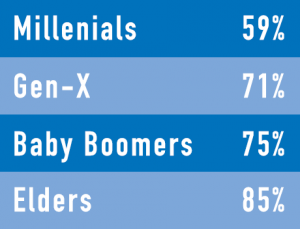71% of people say they feel overwhelmed by the amount of information they need to stay up to date, according to a 2013 Barna Group survey.[1]

Who wouldn’t in an over-informed, hyperlinked, data-consuming society? While Siri directs us to a restaurant, we can read its reviews and determine our dinner order between scanning breaking news notifications (that we MUST read now for dinner conversation fodder) as we text our friend the play-by-play that we are on our way…stuck behind a train…just parked…walking in now…
And that’s just recounting a drive to a restaurant. That’s like a single swig in a day of drinking from the information hose.
Don’t get me wrong, living in the Information Age is truly an exciting time in history. Nicholas Carr, author of the critically acclaimed book The Shallows, touts that the internet “may well be the single most powerful mind-altering technology that has ever come into general use” besides the alphabet and number system. [2] That’s a big time statement! The use of the internet is being compared to the essentialness of using the alphabet, the foundational unit of communication!
For many of us, the use of the internet and our accessibility to it does seem foundational for our life happenings, doesn’t it? We can connect with people across the country and around the globe in one click. We have access to credible sources that can inform our purchasing decisions or provide medical counsel. I am able to regularly collaborate with a coworker that lives over 500 miles away without having to worry about office hours or work schedules due to the beauty of a thing called Facebook Messenger. I work closer with this coworker on some projects than I do with other coworkers who are less than 50 steps from my physical desk space.
And still, 71% of people say they feel overwhelmed by the amount of information they need to stay up to date. That jumps up to 74% for people who self-reported as being church attendees. We are not just talking about Boomers here either. Here is how the Barna Group survey breaks it down[3]:

I fall in that 59% of Millennials who feel overwhelmed, and part of my job for LCMS Youth Ministry is overseeing the media efforts for the LCMS Youth Gathering! So when pixel pushing is part of our job description (and that will arguably only become increasingly more of the case), how can we learn to survive, and dare I say, thrive in the waters of the “hyperlinked life” as Jun Young and David Kinnaman put it?
“And God saw everything that he had made, and behold, it was very good. And there was evening and there was morning, the sixth day.
Thus the heavens and the earth were finished, and all the host of them. And on the seventh day God finished his work that he had done, and he rested on the seventh day from all his work that he had done. So God blessed the seventh day and made it holy, because on it God rested from all his work that he had done in creation. Genesis 1:31 – 2:3 (ESV)
Ah yes, that reminder that we are to rest as God modeled for us in the creation of the world. Let me set a reminder quickly on my phone calendar to do that…
While I write that tongue and cheek, that is exactly what I need to do: Rest.
God has modeled for us both how to work with great creativity and strength and yet also how to rest, to abstain from this effort. As technology keeps both work and play right at our fingertips, the lines and times for when and how to work and rest are blurred.
Young and Kinnamann share several practical ideas for keeping a “balanced diet” of media use in our work and play. They encourage weekly practices like:
- Taking one full day to unplug and only use your phone to make calls.
- Replacing screen time with face-to-face time.
- Replacing media time with any activity you might do on a restful vacation like going for a walk, grabbing coffee with a friend, doing a hands-on project, playing an instrument, etc.
- Setting time limits around when you will check your email or scroll through your newsfeed.
- Turning off push notifications on your phone.
- Putting your phone in a basket when you get home in the evening and not touching it unless it is actually needed (i.e. to make a phone call).[4]
They also suggest going on a “digital detox” once or twice a year where you completely disengage from the use of technology for a period of time.
I have been practicing some of these strategies over the past three months. I can see the difference. I am more creative and alert, engaged in the lives of the people around me and sensitive to the vocations God has given me. Honestly, I can’t think of a time that I regretted not being dependent on my iPhone during those moments of sabbath. It’s been re-energizing so that I can continue to swim these waters, helping connect youth leaders online, provide LCMS Youth Ministry online resources and updates and serve where God has placed me using the technology that is available in this hyperlinked life.
[1] Jun Young and David Kinnaman, The Hyperlinked Life: Live with Wisdom in an Age of Information Overload (Grand Rapids, MI: Barna Group, 2013) 15.
[2] Nicholas Carr. The Shallows: What the Internet is Doing to Our Brains (New York: Norton, 2011), 116.
[3] Young and Kinnaman 2013, 45.
[4] Young and Kinnaman 2013, 68-69.